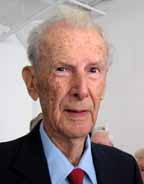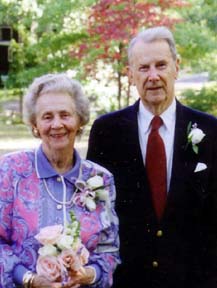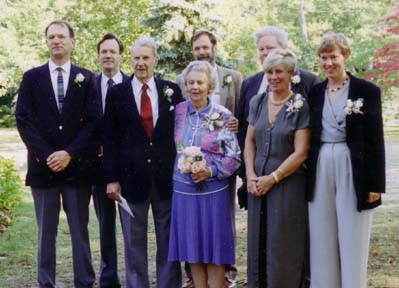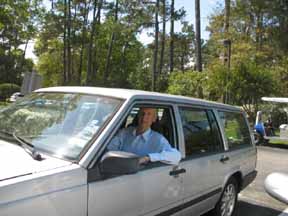|
|
Karl D. Hartzell, Ph. D.
... a celebrated life
|
Karl Drew Hartzell, Ph.D., has had a long and
distinguished career as a successful and
respected professor, dean, and administrator in
higher education institutions, as well as high
level government administration positions in New
York State following WWII, resulting in his
first book: "Empire State at War: World War
II." This led to his appointment as
Administrative Officer at the newly founded
Brookhaven National Laboratory. He wrote his
second book, "Opportunities in Atomic
Energy," during his tenure at Brookhaven,
published in 1950. Karl then returned to
academia, becoming dean of Cornell College in
Iowa and thereafter dean of Bucknell University
in Pennsylvania. From there he accepted the
position of Executive Dean in the Central
Administration of the |
 |
|
New York State University System and was
assigned to the State University at Stony
Brook, where he was instrumental in building
programs at that campus, a challenge he took
on in his late 50s through a mandatory
retirement at age 65 in the mid 1960s. |
|
RETIREMENT YEARS
Karl then returned to his long-standing interest
in religion, founding, with others, the
Institute for the Study of World Religions on
Long Island, on the Stony Brook campus. He and
his wife Anne enjoyed building a home of
their own in nearby Old Field. Anne started to
teach piano, which she continued for the
next 10 years; she became president of the
Suffolk Symphony followed by Karl as president.
In 1969-1970, he took what he
describes as the first sabbatical of his career
to pursue his developing interest in the field
of values, which, he says, he didn't know much
about so he thought it would be wise to put in
the time to study. Karl attended both Union
Theological Seminary in the fall and Yale
Divinity School in the spring.
"Nobody was talking about values at
that time; it was ethics and theology or history
of religion or philosophy of religion. So I
thought I needed some background, because in
those days, if you looked in the catalogue of
the Library of Congress and looked for values,
it said: "See worth." Now that's an economic
term."
Ultimately, as a member of the
Committee on Religion of the American
Association of Colleges, Karl put on a
Conference about religion at Stony Brook, which
resulted in a small book: "Religion on the
Campus of Today," published by the American
Council
on Education.
Karl officially retired in 1971 and
he and Anne went to San Francisco to visit their
son Julian. Their travels continued into the mid
'70s, taking a train trip across Canada, to
England to visit Drew, who was studying there at
the time, and to Saudi Arabia to visit a friend
they had made while at Bucknell, to Italy and
then to the South of France, visiting
friends they had met over the years along the
way. "It was a wonderful way to begin their
retirement years," Karl recalls.
Karl credits wise investments over
the years with giving him the financial freedom
to do what he has come to regard as a labor of
love: work in the field of values and valuation,
and had planned from that time eventually to
write a book as a result of his studies and
efforts in this area. That book was
published when Karl was 99, and titled:
"American Values: The Laws of Living."
Unfortunately, their
idyllic retirement years were interrupted by
Anne's illness, Alzheimer's. Karl's plans to
write his book were put on hold while he cared
for her. They began to spend time in Florida
where Anne had a dear friend from her college
years. Karl lost his beloved wife when he was
85.
And then a new chapter of his
life opened: Karl met his second wife,
Betty, while in Florida, and they married, with
the blessings of both their children, when Karl
was 87. Karl sold his home on Long Island and
moved permanently to Florida with Betty. They
enjoyed a dozen years together, living in an
active retirement center. |
| |
|

Wedding Day:
Betty and Karl, 1993 |

Wedding Day: Karl
and Betty (center)
with their families, 1993 |
THE PRESENT
Karl continues to live independently. He was active
swimming and playing tennis into his 90s and
continues playing 18 holes of golf twice a
week. He's a member of the chorus at the
retirement center, and finished and published
his book on values at age 99. Proficient on
the computer for years, Karl is now hard at work
on his Memoirs, writing on his computer; his
plan is to publish them later this year. |
Karl's writing was interrupted by
his trip to New York City in
September of 2007 as part of the
Barbara Walters Special "Live to be 150" (Click
to read more about the Special)
accompanied by his son, Drew, and the
resulting local notoriety. Karl also enjoys
keeping in close touch with his sons and visits
them frequently. He drives and is totally
independent — including flying from Florida to
his sons' homes in the Northeast.
Karl continues to be an extraordinary |
 |
person —
now an extraordinary centenarian. He
sums up his personal life by saying: "I
have been very happy in my life with
both wives and with my children. I'm
proud of my children; they have been not
only sons but friends and
conspirators/co-conspirators. And
they've been fun!
"When I
see what happens in other peoples'
families: children that go off and get
lost and the parents don't know where
they are; children that insist that they
have the house
which prevents the parents from selling
it and having the money to go into a
satisfactory retirement community;
children that are opposed to each other
or make bad marriages; all of that my
family has avoided. I think part of it
is good judgment; part of it is a sweet,
generous, kindly disposition." Adding:
"A good part of that comes from their
mother!"
Karl has graciously contributed an early
draft of his memoirs, which details the
first half of his life and his
interesting ancestry.
Click to
begin reading his memoirs. |
- top -
|
1998-2018 National Centenarian Awareness Project & Lynn Peters
Adler, J.D.
No material, in whole or in part, may be reprinted
or reproduced in any form without the prior written permission
of Lynn Peters Adler and the National Centenarian Awareness Project.
|